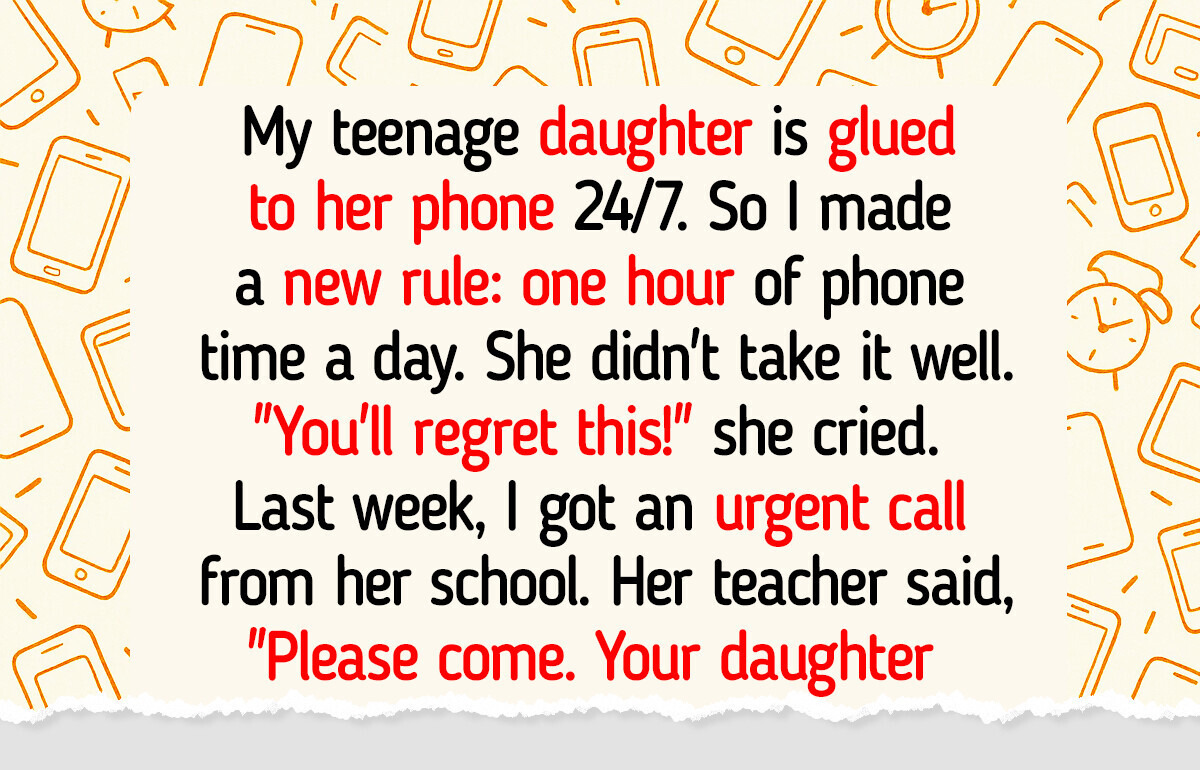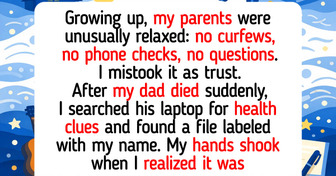She's not your best friend, stop feeling bad. She's trying to manipulate you so she's calling the shots. If she can't live with just an hour of screen time a day, then there is a problem!
I Limited My Daughter’s Screen Time to an Hour, She Made Me Regret This

When one mom limited her daughter’s screen time, she didn’t expect a meltdown. But what began as a simple rule quickly became a rift between them. This isn’t a story about screen time—it’s about decoding teenage grief, survival instincts, and how to talk without losing trust.
My teenage daughter is glued to her phone 24/7. So I made a new rule: one hour of phone time a day. She didn’t take it well. “You’ll regret this!” she cried.
Last week, I got an urgent call from her school. Her teacher said, “Please come. Your daughter is in the principal’s office.” I rushed over.
Turns out, she’d been caught using a phone in class—browsing TikTok during a lecture. “But I have her phone,” I said. They showed it to me.
It was a different phone, definitely not the one I confiscated. She’d gotten it from a classmate who had a spare and had been hiding it in her locker.
When we got home, I confronted her. She didn’t even deny it. “You don’t understand!” she snapped. “My friends are everything! You cut me off from everyone!”
I said, “You lied. You broke school rules. And you went behind my back.”
She cried. I stayed calm, but inside, I was boiling. Not just from the disobedience, but because I felt like I didn’t even know her anymore. I ended up grounding her.
But I worry it’s not solving the real problem—just making it worse. Now, every time I try to talk to her, she looks at me like I’m the enemy. What shall I do now?
Meghan
Hi Meghan,
Absolutely—this situation is a ticking emotional time bomb. So let’s take a breath, take off our judgment coats, and step inside the tangled, buzzing world of a teenage heart trying to be heard through a phone screen.
1. The phone isn’t the problem—it’s the lighthouse.
Your daughter isn’t just scrolling. She’s anchoring. Teens don’t cling to their phones because they’re lazy or defiant—they cling because it’s where they live. Their digital world isn’t separate from their real life; to them, it is real life. Friends, feelings, fears, and even their sense of self are wrapped up in those apps and group chats. So when you took away the phone, it didn’t feel like a timeout—it felt like exile.
Instead of framing the phone as the villain, try exploring what she is really using it for. Is it social validation? Escapism? Fear of missing out? Or maybe a way to control the chaos of teenage emotions by swiping into something fun and fast? Ask her—not in a stern, “tell me what you did” way, but in a curious “teach me what this means to you” kind of tone.
Try this:
🗣️ “When you said your friends are everything, that stuck with me. Can you help me understand what being connected to them feels like? What do you miss the most when your phone is off?”
You’re not giving in—you’re opening a window.
2. She’s not just lying—she’s strategizing.
The second phone wasn’t just disobedience. It was creativity under pressure. Yes, she broke your rule. Yes, she was wrong. But what if, instead of seeing this as “she lied to me,” you saw it as “she found a survival tactic”?
Her world suddenly shrank to one hour a day, so she engineered a workaround. That might sound defiant, but underneath it is desperation. Teens are like wild seedlings: if you press too hard from above, they’ll bend sideways and grow in strange ways just to reach the light.
So here’s your moment to pivot:
🗣️ “I was angry because I felt hurt and betrayed. But I also realize you were trying to hold onto something important to you, even if it meant hiding it from me. That matters. I want to understand what felt so urgent about being online that you were willing to risk getting into trouble.”
The goal isn’t to catch her—it’s to catch up to her. To show her she doesn’t have to lie to be heard.
3. She thinks you’re the enemy—but you’re really the translator.

Right now, your daughter isn’t rejecting you. She’s rejecting the version of you that seems to threaten her lifeline. What she doesn’t realize is that you’re both on the same side, fighting to help her grow, but you’re speaking different emotional dialects.
You speak logic. She speaks feeling. You say, “School rules,” and she hears, “You don’t care how I feel.” You say, “You broke trust,” and she hears, “You’re all alone.” What she needs is someone who speaks both languages fluently.
Try this shift:
🗣️ “You’re not in trouble right now. I’m just your mom trying to understand what’s hurting you so much that you’d risk everything for it. I don’t want to control you—I want to support you, but I need to know what that looks like for you.”
Give her a seat at the table—not as a child under punishment, but as a young person figuring things out. And even if she doesn’t answer right away, she’ll remember how you made space for her voice.
And while some parents wrestle with screen time, others uncover secrets that shake the entire foundation of trust. One woman thought her stepdaughter was sneaking money from her—but what hidden cameras revealed was far more chilling.
Comments
A cell phone should not be a child's world. That's crazy!
Related Reads
I Canceled Thanksgiving After My Husband Secretly Invited His Ex-Wife - His Reason Was Revolting

I Refused to Attend My Son’s Wedding And Instead Spent the Day With His Ex-Wife

I Want to Divorce My Husband Because He Shaved My Head

I Asked My Stepdad Not to Attend My Wedding to Please My Dad

My Husband Ignored My Birthday in Favor of His “Work Wife’s” Party, I Taught Him a Lesson of Respect

15 People Who Married for Money Reveal How Their Life Went After

I Discovered My Husband's Dark Secret, and Now My World Is Shattered

18 People Who Would Hardly Be Able to Forget Their Vacation

10 Times We Realized We Wouldn't Trade Our Parents for the World

10 Stories Where Kindness Made People Human Again

My In-Laws Forced Me to Leave My Vacation Early—They Crossed Every Line

13 Parents Who Chose Their Kids Even When It Cost Them Everything



